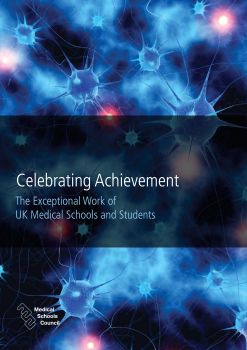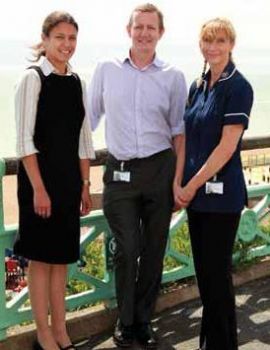BSMS initiatives recognised by Medical Schools Council
Posted on behalf of: BSMS
Last updated: Monday, 29 July 2013


The Pathway Homeless Research Trial in Brighton is featured by the Medical Schools Council as an example of a project delivering benefits to the local community. L-R: Leila Powell, project support and year-1 medical student; Dr Chris Sargeant, GP Lead, an
Two initiatives by Brighton and Sussex Medical School (BSMS) have been recognised by the representative organisation for UK medical schools.
On Tuesday (23 July) the Medical Schools Council published Celebrating Achievement: The exceptional work of UK medical schools and students.
The booklet consists of pieces linked to one of five themes: medical education; delivering benefits to the local community; values-based selection and widening participation in medicine; global and population health; and inspiring the clinical academic medical researchers of the future.
The Pathway Homeless Research Trial in Brighton is featured (on pages 17-18) as an example of a project delivering benefits to the local community.
It looks at the effect of a GP-led team monitoring the care and discharge of homeless people admitted to the hospital, which now recruits over 50 patients.
There is joint effort on the wards between Dr Chris Sargeant, a GP with experience in homeless people’s healthcare and Senior Clinical Lecturer at BSMS, and Penny Johnson, an experienced Nurse Practitioner.
Leila Powell, a first-year medical student at BSMS, is also involved, providing part-time project support.
As a result of this work, a new special study component for third-year BSMS medical students, ‘Healthcare of Homeless People – mission impossible?’ has been launched and the first students are now seeing patients, visiting community services and researching the health needs of homeless people in the Brighton area.
BrightMed, the widening participation programme run by BSMS and delivered by a mix of academic faculty, clinicians and students, is featured (on pages 28-29) in the section on encouraging widening participation in medicine.
All state secondary schools in Sussex are contacted each year and asked to nominate able pupils. Criteria for selection include: first generation into higher education; social-economic background; school performance; and residential postcode.
Since 2006, 643 students have been recruited onto the programme and BrightMed is currently working with 248 students.
To date all students (with only one exception) who have applied to study medicine and have met the academic criteria have had at least one interview. Of those, 70% have received offers.
Professor Tony Weetman, Chair of the Medical Schools Council, said: “In a time of such rapid change in the NHS and all levels of healthcare it is crucial to have new doctors who are able to deal with complex and ever-changing pressures.
“This requires considerable grounding in medical knowledge and practice, of course, but it also requires a developed sense of care and empathy, the ability always to engage with patients on a human level.
“Initiatives such as those highlighted in Celebrating Achievement are therefore creating a better healthcare environment for everyone. They are part of a medical education system which produces some of the best young doctors in the world – who are themselves equipped to innovate and guide future generations.”

